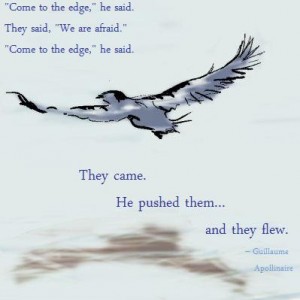THIS POST IS FOR WRITERS:
“Keep it strong and direct.”
Dear Writer, please make the above quote your watchwords: “Keep it strong and direct.” Your readers will love you for it.
As the author, you must be the authority. Readers expect you to provide a strong and decisive narrative voice, the true authority, and to convey the story with confidence. This, in turn, builds confidence within the readers and makes their reading experience more enjoyable.
Avoid weak phrases that harm the narrator’s credibility. First, you must decide, once and for all, that you’re confident in your own ability to tell a story, that you enjoy the courage of your convictions. Do not allow your narrator to get weak knees, and to use weak qualifiers that display an utter lack of self-confidence.
BAD: She seemed to walk as though her leg was bothering her.
(Note: Please… just say it!)
GOOD: She limped.
BAD: Maybe he should grab the gun from the bureau drawer before he answers the door.
(Note: This sort of weak hesitation in the main narrative is murder on a story. Now, if you employ this sort of weakness in dialogue, or in a character’s silent monologue, it would be appropriate if such weakness fits that particular character. In the main narrative, you need to get right to it and paint the scene.)
GOOD: He grabs the gun from the bureau drawer, tucks it under his belt at the small of his back, and takes a deep breath before answering the door.
BAD: He probably should have taken Cindy up on her offer. If he had, he’d be with her right now.
(Note: This sort of construction is quite common, and is both wordy and weak. You can convey his sense of regret in concise terms.)
GOOD: If only he’d taken Cindy up on her offer, he’d be with her right now.
TRIGGERS
Seemed, tried to, could, should, maybe, perhaps, possibly, might, began to, started to, etc.
When you utilize words such as those above, let them trigger a critical self-review. Ask yourself, “Have I gone weak in the knees?” There are many appropriate uses of those words, of course, but most writers overuse them to the detriment of their stories. If you can answer the question, “Nah, I really need that word here,” then great! Just be honest with yourself, and always keep in mind what readers expect of you, and don’t forget your watchwords: “Keep it strong and direct.”
Another sure sign of weakness is the excessive use of state-of-being verbs:
Am, is, are, was, were, to be, had been, etc.
We call these state-of-being verbs because that’s all they do: convey a state of being. They convey no action, no sense that something is actually happening, which makes them—say it with me now—dull. Most of the time, you need simply stretch yourself a bit in order to create a more action-centric sentence. This typically means you must restructure your sentence(s). Keep it simple, and remain in active voice: Subject commits Act upon Object. If you adhere to that basic structure, that basic concept, you’ll find a solution.
Beware also those verbs that, while not strict state-of-being verbs, nonetheless convey little or no action:
Did, had, went, came, got, took, kept, made, put, had, etc.
In the following example, from a piece I edited (character name changed to maintain author confidentiality), examine the number of weak, inactive verbs, and the weak qualifiers, in the original “bad” version. Then compare the revised “good” version, and examine the more active verb choices. Key: They need not be earth-shattering, thrilling, grab-your-socks-and-hold-on verbs—merely verbs that convey some sense of action, something more than a simple state of being.
BAD: Mary was more popular than I was. It wasn’t any large mystery as to why she was popular with guys, or why she had boyfriends who were routinely among the most good-looking, athletic, etc. In addition, she also had a large amount of other friends who always seemed to be with her and who always seemed to enjoy her company. I had friends too, a fair amount of them; however, being an adolescent, I was a part of the inescapable hierarchy that slated a certain top group of kids as popular and positioned other groups in sequential status order on down. While I was far from the bottom rung of this ladder, I knew that Mary held a much higher position on it within her own respective class.
GOOD: I couldn’t fathom Mary’s popularity. Her boyfriends routinely stood out as the most good-looking and athletic. Her regular friends numbered in the dozens and hovered around her, always placing her, the star around which the others orbited, at the center of attention, pleased just to share her company. I enjoyed a fair number of friends too, but we occupied a lower position in that inescapable adolescent hierarchy, the one that elevated a certain top group of kids to popular status, while relegating the rest of us lower in the pecking order. I stood far above the bottom rung of this tall ladder, but Mary occupied one near the top. She shared that rarified air with friends and members of her own respective class.
Don’t be hesitant. Display your self-confidence as author. You may use the so-called “weak” verbs and qualifiers I listed above, but please do so sparingly. When you do, ask yourself the critical question: “Does it truly add to the tension of the moment, to the characterization, to the conflict or resolution—or is it just weak?”
In very general terms, there is no single right answer. You must determine that on an individual basis, but allow those words to trigger your critical self-review. Be honest with yourself, and then stretch yourself to provide the reader with something more evocative. Don’t move on until you’re confident you’ve made the right choice.
In closing, let me remind you—because I just can’t seem to say it enough—to make these your watchwords: “Keep it strong and direct!”
‘Til next time, remember this: Writing well is not easy. It takes work. You mustn’t be lazy.




Leave a Reply